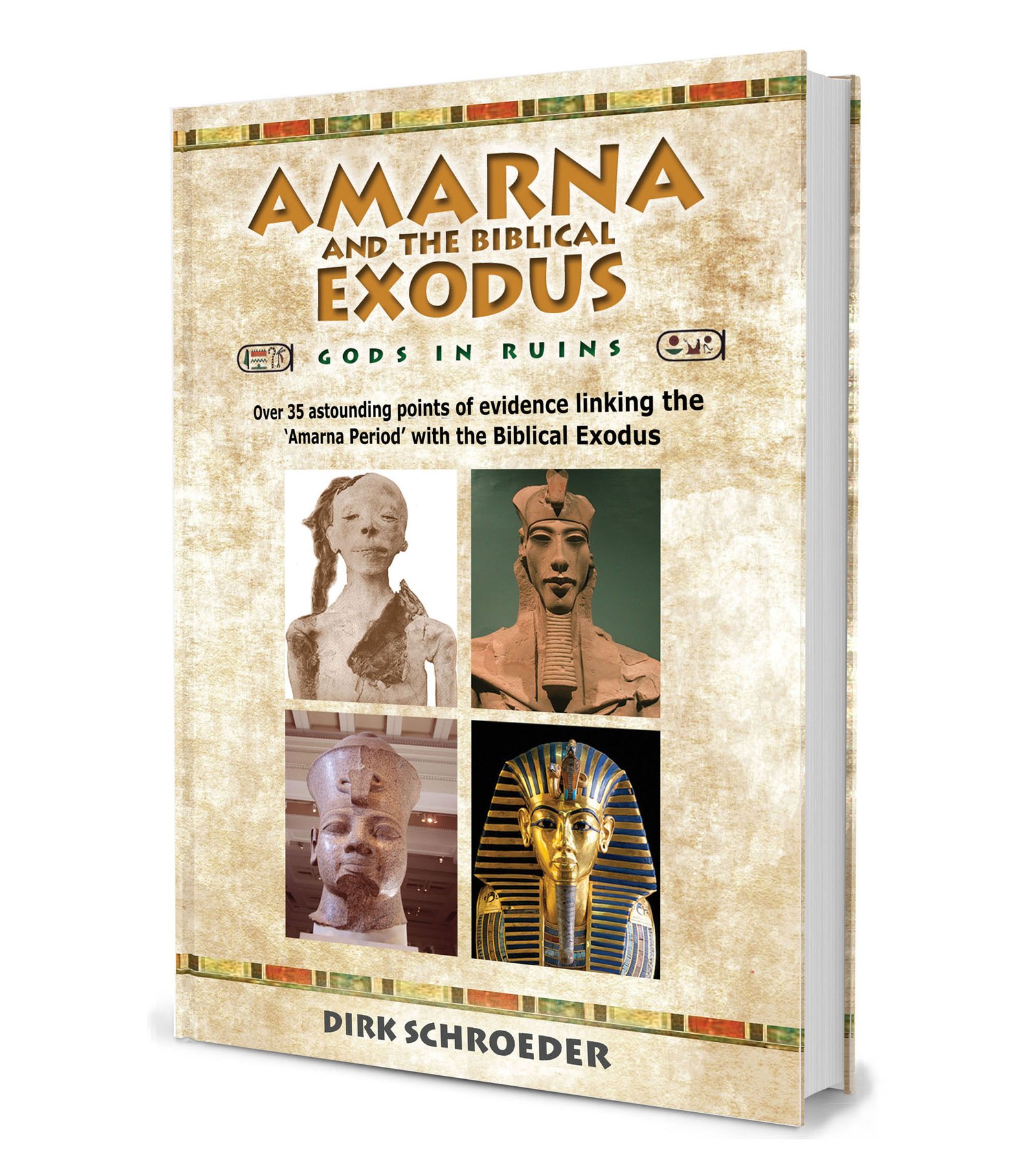


REVIEWS & DISCUSSION COMMENTS...
Review by Chris Phillips, Egyptology writer, published by Bestsellersworld.com.
"very good for modern Hebrew, Christian and related believers".
"this might be used well as a basis for a series of lessons within some schools or religious groups."
"Dirk Schroeder has discovered what he believes to be incontrovertible evidence that the Biblical Exodus actually occurred, and that it coincided with the reign of Amenhotep III. He shows that Amenhotep IV was the pharaoh after this who tried to make sense publicly what happened to the army, the special forces and all the military and physical wealth of Egypt after the Hebrews exited the country. Whenever someone wishes to provide historical, verifiable evidence of an ancient event, it primarily involves major research. Schroeder has spent the time and effort to do this research.
It is significant to identify an unusual Pharaoh’s reign that involved a lot of disruption and changes. The historical evidence provided in this book gives a plausible explanation in the very unusual reign of Amenhotep IV (Akhenaten is his changed name after a few years into his reign). Schroeder posits that the Hebrews left Egypt, free from their slavery when Egypt was the crown of civilization for most of the world.
Using the historical work of several archaeologists, some as early as the 1800s up to work done as recently as 2015, Schroeder provides a written explanation of those findings and a pictorial collage of various artifacts including their present location in case the reader wishes to investigate on their own.
After spending much time with covering chronology and corresponding documentation with associated artifacts, Schroeder goes into some detail equating Amenhotep III as a shamed pharoah. There is some evidence, well presented in the book, that Amenhotep III died suddenly, leaving a number of questions about why and how he passed. Additionally, his crown prince is shown to have died at a young age, leaving the second son as the heir apparent. Also, Amenhotep IV has some quantity of correspondence and evidence from buildings and other sources that indicates he was indeed the second son of Amenhotep III and in turn became Amenhotep IV after some time with his mother, Tiye, as de facto queen and ruler until he came of age, evidenced by correspondence dated after the reign of III into the time of IV’s reign.
None of the evidence is specific in naming Moses, the Hebrews, or anything about the sudden loss of slaves, but there is now seen to be primarily circumstantial and physical evidence explaining this period.
The author has some very interesting ideas that are brought into the narrative. He expresses a belief in the Bible account. Also, the final chapter acquaints the reader with the Habiru, (various spellings) refuting in detail the popular idea that they may have been the Hebrews. In between is a compilation of heavily researched information and a unique academic perspective used to interpret this evidence.
This book is very good for modern Hebrew, Christian and related believers. Students of history and especially those of the Egyptian Dynasties would find this information quite thorough in presentation. Also, this might be used well as a basis for a series of lessons within some schools or religious groups."
Comment by Jose Ortega, Egyptologist, on Academia.edu.
"Egypt three years ago and carried your book...".
"I traveled to Egypt three years ago and carried your book as conceptual guide to your ideas and are more convinced than ever that they reflect the impetus that inspired Akhenaten."
Comment by Douglas N Petrovich, Egyptologist, on Academia.edu.
"I agree...".
"I agree completely that Moses (d. 1406 BC) and the Hebrews very likely influenced Akhenaten, which may account for his monotheism, at least to some degree.""
Comment by José Alfredo Gonzalez, Author, on Academia.edu.
"took place during the Amarna period..".
"I coincide with you in considering that the Exodus did took place during the Amarna period. Anyhow, in the Biblical texts there's no clear evidence of it, at least there's no textual evidence. I've done a research about it and my opinion is that the religious process described in Exodus can only be placed during the Amarna period, where Akhenaton was the introductor of a form of monotheism focused in the Aton"
Comment by Sabry Youssif, on Academia.edu.
"topic is wonderful...".
"I think that this topic is wonderful and its relationship with the sacred books is clearly evident when comparing the songs of Akhenaten with the psalms of Prophet David."
Comment by Gary Perkins, Lecturer, on Amazon.com
"A compelling read, well researched and suitably referenced".
I've read far too many books over the years suggesting possible links between ancient Egypt and the Biblical story of the Exodus. Some have been well reasoned out though lacking sufficient detail to convince, while others have quite frankly been appalling and nauseous. As a result, I admit to having to stifle a yawn these days when I see yet another one has been published, and though I acquired Dirk Schroeder's book a little while back have not been as keen to read it as perhaps I should have been.
My initial reservations appear to have been unfounded, however. Set your mind to this book and you will find it a compelling read, well researched and suitably referenced to convince many a skeptic. Definitive evidence this may not be, but Schroeder lists a chain of over 35 points of circumstantial evidence supporting a link between the enigmatic ‘Amarna Period’ of and the Biblical Exodus. Such a wealth of archaeological and scriptural 'coincidences' suggests he is onto something which cannot easily be swept under the carpet, and that Egyptologists may need to re-evaluate their chronology rather than glibly dismissing the Bible account, as happens too readily in recent times.
Comment by eMezcal, on Amazon.com
"Excellent read".
Well written, accurate and very informative.